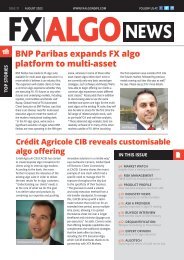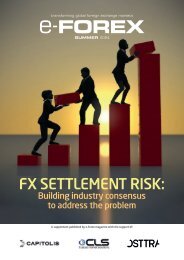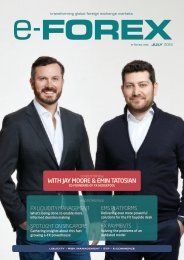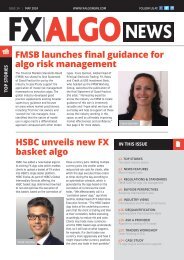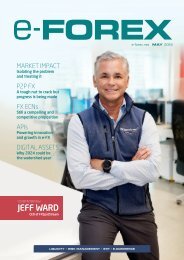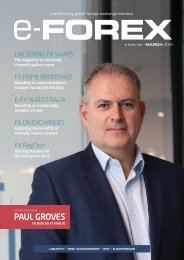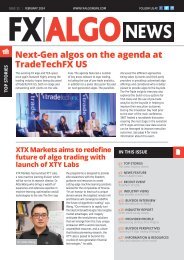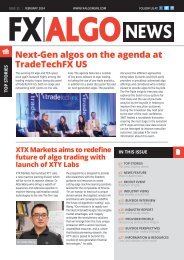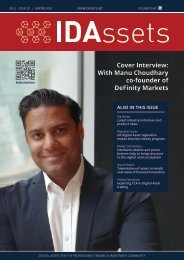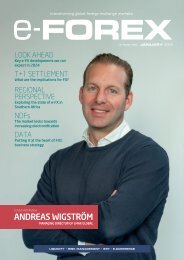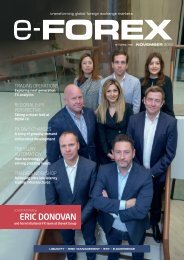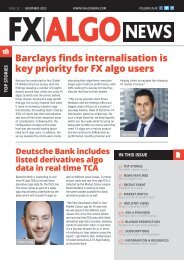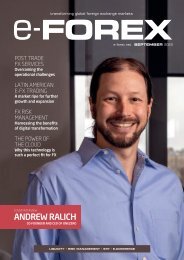You also want an ePaper? Increase the reach of your titles
YUMPU automatically turns print PDFs into web optimized ePapers that Google loves.
REGIONAL E-FX PERSPECTIVE<br />
notes. “Many also have their FX traders<br />
and sales, quants, and IT support staff<br />
move to Singapore.”<br />
TRADER BEHAVIOUR AND<br />
REGULATORY STANCE<br />
Stable regulation has played a key role<br />
in Singapore’s rise as an FX regional<br />
hub. MAS has initiated several AML,<br />
licensing, and risk management<br />
programs that have built trader<br />
confidence, leading to increased<br />
volumes.<br />
Chan cites a recent initiative as an<br />
example of regulation fostering<br />
confidence in the market. “MAS rolled<br />
out an Enhanced Market Surveillance<br />
system, which enables them to<br />
monitor trading activities and detect<br />
misconduct,” he says. “The trading<br />
community has generally responded<br />
positively to these regulations,<br />
understanding that these are to protect<br />
their interests. These regulations have<br />
resulted in a collaborative approach<br />
between regulators and market<br />
participants, with both sides working<br />
together to enhance the overall stability<br />
and growth.”<br />
Wang notes that enhanced regulations<br />
offer opportunities for service providers.<br />
“Regulations usually mean more work<br />
to be done to meet requirements,” he<br />
says. “From our perspective, it creates<br />
opportunities. Recently, there has been<br />
a need for trading platforms to create a<br />
Unique Trade Identifier (UTI). At Spark,<br />
we are more than ready to meet these<br />
needs. Our agility to respond to the<br />
requirements helps to differentiate<br />
ourselves from the competition.”<br />
The combination of regulatory<br />
confidence and technological<br />
adoption has created a few interesting<br />
behavioural trends amongst traders.<br />
Chan cites the growth of institutional<br />
mobile trading as an example and<br />
explains how Edgewater is catering to<br />
this demand.<br />
“While retail traders have traditionally<br />
dominated the mobile trading space,”<br />
he says, “we’ve observed a notable<br />
increase in institutional participation.<br />
Institutions are increasingly recognizing<br />
the convenience and accessibility<br />
offered by mobile trading and are<br />
actively engaging in various activities<br />
through mobile platforms.”<br />
But do mobile platforms offer the<br />
flexibility and customization inherent<br />
to desktop versions? “To cater to<br />
individual or firm-specific rules and<br />
requirements, Edgewater’s mobile<br />
trading platform offers comprehensive<br />
permissioning capabilities,” Chan<br />
explains. “This ensures institutions<br />
can tailor the platform to align with<br />
their unique trading strategies,<br />
risk management protocols, and<br />
compliance guidelines.”<br />
“Edgewater has introduced a branded<br />
white-label tool that enables clients to<br />
extend the benefits of mobile trading<br />
to their own clients,” he adds. “This<br />
white-label solution allows institutions<br />
to offer a fully customised and branded<br />
mobile trading experience to their endusers,<br />
maintaining consistency with<br />
their overall brand identity.”<br />
LOOKING AHEAD<br />
Singapore has risen significantly in the<br />
FX world but faces stiff competition<br />
from the likes of Hong Kong and<br />
Tokyo in the region. Chan thinks a<br />
steady commitment to infrastructure<br />
development is critical to maintaining<br />
and growing Singapore’s position in<br />
the market. “By continuing to invest<br />
in infrastructure, Singapore can<br />
stay ahead in the race and provide<br />
a solid foundation for companies<br />
like Edgewater to deliver their<br />
forex platform seamlessly,” he says.<br />
“Incentivising key players to participate<br />
is also essential for Singapore’s success.<br />
The government and regulatory bodies<br />
can introduce initiatives and incentives<br />
to attract prominent forex companies<br />
and encourage their active involvement<br />
in the market. By fostering a vibrant<br />
ecosystem with a diverse range of<br />
participants, Singapore can ensure<br />
healthy competition and innovation<br />
within the forex industry.”<br />
He also notes that talent development<br />
and migration are key growth levers<br />
for the city-state, allowing it to build<br />
a pool of proven expertise. Wang is<br />
similarly optimistic about Singapore’s<br />
growth. “We didn’t get here<br />
overnight,” he says. “There’s a lot of<br />
hard work involved by all parties, which<br />
include the MAS, the sell side banks,<br />
the FX buy side, the ECNs as well as<br />
the vendors. All parties must work<br />
to stay relevant in the ever-changing<br />
landscape to maintain Singapore’s<br />
status as a successful FX centre.”<br />
Jason Wang<br />
“We didn’t get here overnight, All parties must work to<br />
stay relevant in the ever-changing landscape to maintain<br />
Singapore’s status as a successful FX centre.”<br />
JULY 20<strong>23</strong> e-FOREX 41



